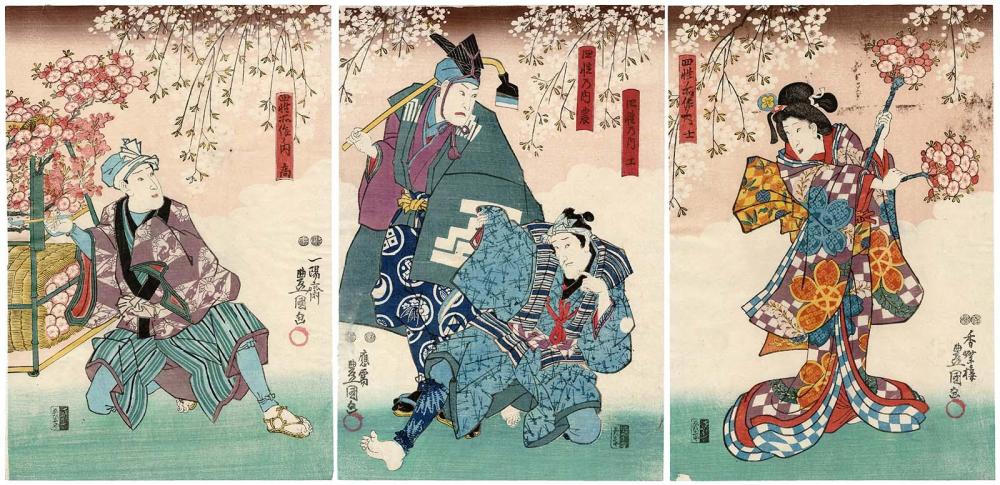Advanced Search 
「四性ノ所作ノ内 士」初代坂東しうか 「四性の内 工」三代目関三十郎、「四性の内 農」四代目中村歌右衛門 「四性所作ノ内 商」十二代目市村羽左衛門

Actors Bandô Shûka I as the Ruling Class (Shi) (R), Seki Sanjûrô III as the Artisan Class (Kô), Nakamura Utaemon IV as the Farming Class (Nô) (C), and Ichimura Uzaemon XII as the Merchant Class (Shô) (L), from the Dance of the Four Social Classes (Shisei shosa no uchi)
「四性ノ所作ノ内 士」初代坂東しうか 「四性の内 工」三代目関三十郎、「四性の内 農」四代目中村歌右衛門 「四性所作ノ内 商」十二代目市村羽左衛門
Utagawa Kunisada I (Toyokuni III) (Japanese, 1786–1864)
Publisher: Ebisuya Shôshichi (Kinshôdô) (Japanese)
Publisher: Ebisuya Shôshichi (Kinshôdô) (Japanese)
Japanese
Edo period
1849 (Kaei 2), 4th month
Medium/Technique
Woodblock print (nishiki-e); ink and color on paper
Dimensions
Vertical ôban triptych; 35.5 x 73.4 cm (14 x 28 7/8 in.)
Credit Line
William Sturgis Bigelow Collection
Accession Number11.39686a-c
NOT ON VIEW
CollectionsAsia, Prints and Drawings
ClassificationsPrints
DescriptionMFA impressions: 11.39686a-c, 11.45549a-c
Play (shosa): Yomi to Uta Tosa-e no Irodori
Play (main feature): Omegumi ni Uruo Iwafuji
Theater: Ichimura
四民歌土佐画彩(よみとうたとさえのいろどり) 常磐津
恵閏初夏藤(おめぐみにうるをいわふじ)
市村、二番目大切
Play (shosa): Yomi to Uta Tosa-e no Irodori
Play (main feature): Omegumi ni Uruo Iwafuji
Theater: Ichimura
四民歌土佐画彩(よみとうたとさえのいろどり) 常磐津
恵閏初夏藤(おめぐみにうるをいわふじ)
市村、二番目大切
Signed
Kôchôrô Toyokuni ga (on right sheet), Ôju Toyokuni ga (on center sheet), Ichiyôsai Toyokuni ga (on left sheet)
香蝶楼豊国画(年玉印) 応需豊国画(年玉印) 一陽斎豊国画(年玉印)
香蝶楼豊国画(年玉印) 応需豊国画(年玉印) 一陽斎豊国画(年玉印)
Marks
Censors' seals: Fuku, Muramatsu
No blockcutter's mark
改印:福、村松
彫師:なし
No blockcutter's mark
改印:福、村松
彫師:なし
ProvenanceBy 1911, purchased by William Sturgis Bigelow (b. 1850–d. 1926), Boston [see note 1]; 1911, gift of Bigelow to the MFA. (Accession Date: January 19, 2005)
NOTES:
[1] Much of Bigelow's collection of Asian art was formed during his residence in Japan between 1882 and 1889, although he also made acquisitions in Europe and the United States. Bigelow deposited many of these objects at the MFA in 1890 before donating them to the Museum's collection at later dates.
NOTES:
[1] Much of Bigelow's collection of Asian art was formed during his residence in Japan between 1882 and 1889, although he also made acquisitions in Europe and the United States. Bigelow deposited many of these objects at the MFA in 1890 before donating them to the Museum's collection at later dates.
